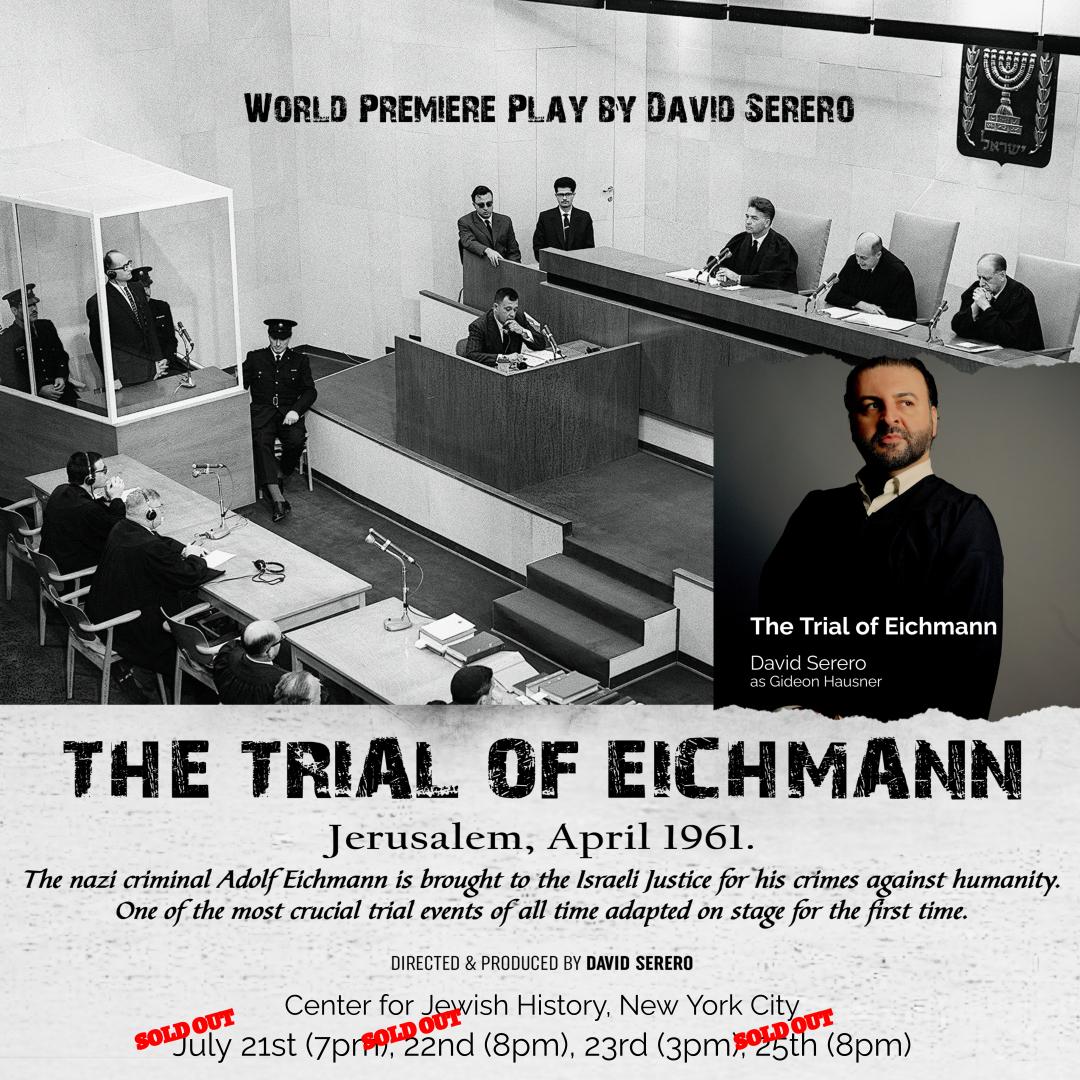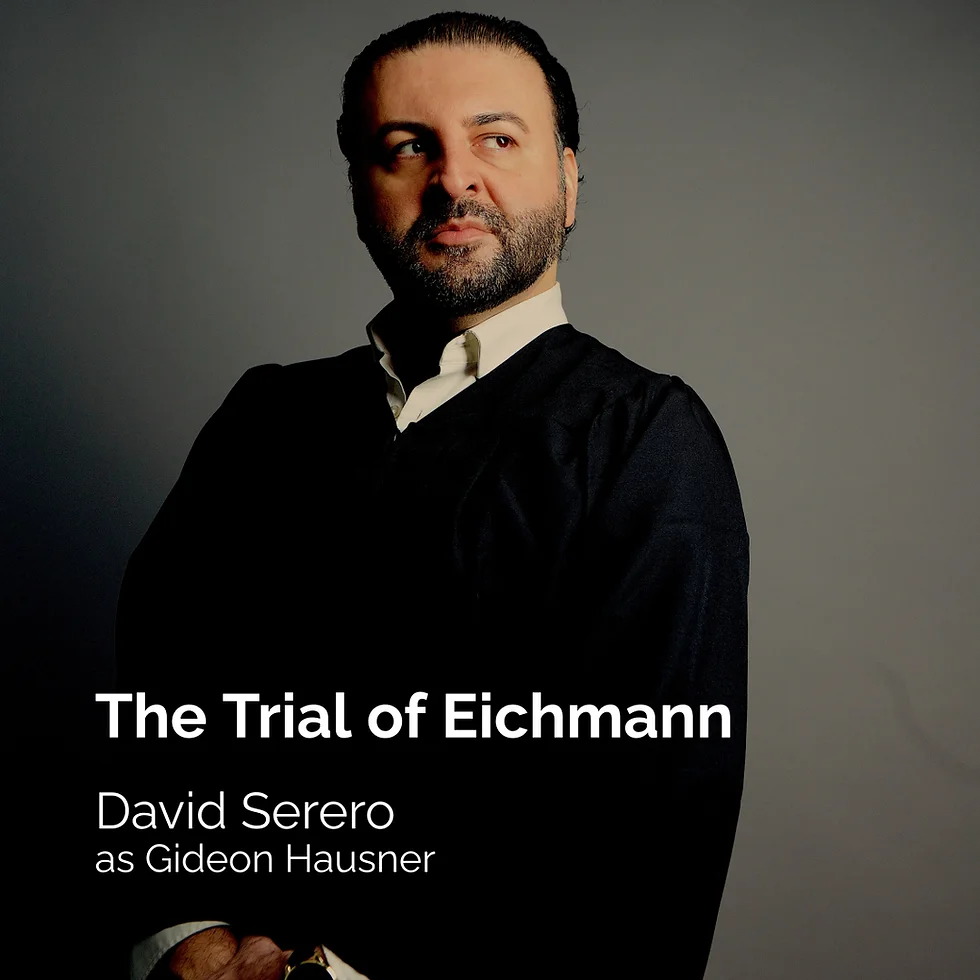
“The Trial of Adolf Eichmann” was a historical trial; now, it’s a masterpiece theater play
New York, July 23rd, 2024 – David Serero’s “The Trial of Adolf Eichmann” takes the stage Off-Broadway, grappling with the complexities of the infamous trial and the enduring stain of the Holocaust. The play doesn’t shy away from the emotional weight of the subject matter, offering a robust and unflinching exploration of justice, accountability, and the depths of human nature. The Trial of Eichmann is a masterpiece and is now a reference for any play on the subject. A sold-out run in New York and audience satisfaction proved it right.
David Serero’s script masterfully distinguishes between historical accuracy and dramatic tension. We witness the legal chess match between prosecutor Gideon Hausner (played by Serero himself), defense attorney Robert Servatius (Bruce Biggins), and the accused, Adolf Eichmann (Michael Takiff). The courtroom becomes a battleground, not just for Eichmann’s fate but for the very soul of justice for humanity.
David Serero’s decision to portray Eichmann as an ordinary bureaucrat rather than a monstrous caricature is bold. This “humanization” forces the audience and Gideon Hausner to confront the disturbing reality that seemingly average individuals can perpetrate such evil. The play doesn’t flinch from the emotional toll. The survivors’ testimonies (excellently played by Harry Cooke and Orlando Shelly) pierce through the audience, exposing raw wounds. For those with personal connections to the Holocaust, this might be a profoundly moving experience.

“The Trial of Adolf Eichmann” transcends a simple historical retelling. It delves into profound questions about forgiveness, reconciliation, and the ability of legal systems to deliver true justice in the face of unimaginable atrocities. Serero’s filmmaking is obvious in the construction of the play and the use of the videos. An audience near me mentioned, “It felt like watching a movie.”
Ron Barba delivers a splendid performance as Judge Moshe Landau, bringing authority to the stage. Harry Cooke gives a stunning performance as Yehiel De-Nur physically fainting on stage. Orlando Shelly portrays the narrator with brio (along with Cooke) and switches flawlessly to Dr Gilbert and Dr Buzminski. Bruce Biggins portrays Dr Servatius with range and power. Starring both as Zvi Aharoni (the Mossad agent who captured Eichmann) and Hausner, David Serero has an unparalleled range of physical emotions and vocal power mixed with an endless panel of colors to embody Gideon Hausner perfectly. You see him questioning Eichmann with emotions, force, stamina, and sometimes even irony, as he did during the capture scene. He carries the trial with his commanding presence, as did Gideon Hausner in the 1961 trial.
David Serero’s meticulous directional attention to detail creates a believable atmosphere, transporting the audience back to the tense courtroom drama. The talented ensemble cast delivers powerful performances, each character adding another layer to the play’s complex tapestry. The brilliant concept of David Serero is to bring the audience fully immersed in the trial to the point of even adding hecklers in the audience to connect with the original trial. He also showcased the “evidence videos” as shown during the trial, showing the atrocities of the concentration camps. While ending the play with a highly emotionally charged monologue, he tells us the unknown chapter of what happened to Eichmann once he was hanged. The moment he empties Eichmann’s ashes into the sea is mighty. He ends his well-written monologue with “Life is back, we won” and turns to show video excerpts from the original trial, emphasizing the moment shown in the play, allowing the audience to be plunged into the reality of this event. Serero returns with a heavy Hatikvah (the Hope), sounding more like a tribute to the Holocaust than ever a national anthem.
It was a sold-out evening, with an audience transported. After the bravo, Serero entered, as always, into his joie de vivre personality to proudly introduce each of his cast members. He did not hesitate to joke with the audience and inspire them with why he wrote that play and the effects this trial had at the time.
“The Trial of Adolf Eichmann” is a challenging yet necessary play. It serves as a stark reminder of the horrors of the past, urging us to confront the darkness within ourselves and strive for a future free from such barbarity. This play is a must-see for anyone interested in history, law, or the enduring legacy of the Holocaust. We can only hope to see this play played worldwide.



